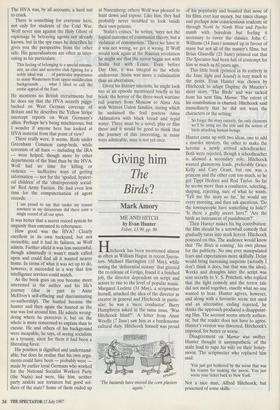Giving him The Birds?
Mark Amory
ME AND HITCH by Evan Hunter Faber, £3.99, pp. 96 Hitchcock has been mentioned almost as often as William Hague in recent Specta- tors. Michael Harrington (10 May), while noting the 'deferential ecstasy' that greeted the re-release of Vertigo, found it a botched job, the director dependent on script and actors to rise to the level of popular music. Margaret Leclere (31 May), a scriptwriter herself, attacked the idea of the director as creator in general and Hitchcock in partic- ular; he was a 'mere conductor'. Barry Humphreys asked in the same issue, Was Hitchcock blind?'. A letter from Anne Woolfe (7 June) saw him as a burdensome cultural duty. Hitchcock himself was proud The bastards have moved the corn plasters again.' of his popularity and boasted that none of his films ever lost money, but times change and perhaps now conscientious students sit through North by North West and Psycho numb with boredom but feeling it necessary to cover the classics. John C. Williams (14 June) summed up in favour of many but not all of the master's films, but Brian Glanville (21 June) pointed out that The Spectator had been full of contempt for him as much as 61 years ago.
This little book (printed in its entirety in the June Sight and Sound) is very much to the point. Evan Hunter was chosen by Hitchcock to adapt Daphne du Maurier's short story, 'The Birds' and was sacked from his next film, Mamie. The extent of his contribution is charted. Hitchcock said immediately that he did not want the characters or the setting:
So forget the story entirely; the only elements we'll be using are the title and the notion of birds attacking human beings.
Hunter came up with two ideas, one to add a murder mystery, the other to make the heroine a newly arrived schoolteacher. Both were rejected, though a schoolteacher is allowed a secondary role. Hitchcock wanted glamorous leads, preferably Grace Kelly and Cary Grant, but one was a princess and the other cost too much, so he got Tippi Hedren and Rod Taylor. So far he seems more than a conductor, selecting, shaping, rejecting, sure of what he wants. `Tell me the story so far,' he would say every morning, and then ask questions. 'Do the townspeople have something to hide?' `Is there a guilty secret here?' Are the birds an instrument of punishment?'
Then Hunter makes his big contribution: the film should be a screwball comedy that gradually turns into stark horror. Hitchcock pounced on this. The audience would know that The Birds is coming', his own phrase for the publicity. No one ever manipulated fears and expectations more skilfully. Delay would bring increasing suspense (actually I don't think it does, but that was the idea). Weeks and draughts later the script was sent secretly to V. S. Pritchett, who replied that the light comedy and the terror tale did not meld together, exactly what no one wanted to hear. Hunter agrees, however, and along with a favourite scene not used and an alternative ending rejected, he thinks the approach produced a disappoint- ing film. The account seems utterly authen- tic, but the reader does not have to agree. Hunter's version was thwarted, Hitchcock's imposed, for better or worse.
Disagreement on Mamie was swifter. Hunter thought it unsympathetic of the male lead to rape his wife on their honey- moon. The scriptwriter who replaced him said:
You just got bothered by the scene that was his reason for making the movie. You just wrote your ticket back to New York.
Not a nice man, Alfred Hitchcock, but possessed of some skills.


























































 Previous page
Previous page